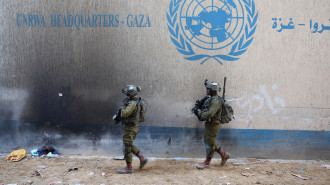Brexit Britain making morally questionable deals in the Middle East
British Prime Minister Theresa May has spearheaded these efforts - from promising lucrative arms deals to the Gulf monarchies and Turkey, while turning a blind eye to flagrant human rights violations. At the behest of the UK government, British Petroleum (BP) also wants to rush in to exploit the oilfields of Kirkuk in Iraq, situated in a tense area disputed between the central government in Baghdad and the Kurdistan Regional Government.
May capitalised upon opposition to Iran in Saudi Arabia and the other Gulf Cooperation Council (GCC) member states last December by promising a reinvigorated British presence of the kind not seen since London formally vacated the strategic region in 1971.
Britain's previous military presence in the region during the 1991 Gulf War and later in Iraq from 2003-09 were never meant to be permanent.
 |
Unsurprisingly, such lucrative arms deals raised serious controversy |  |
A British guarantee of security via military presence in the region comes hand-in-hand with increased British arms deals in the region estimated to value £3 billion ($3.9bn). London has already sold and delivered 72 sophisticated Eurofighter Typhoon jet fighters to Saudi Arabia in a landmark £20 billion deal made back in 2007.
Unsurprisingly, such lucrative arms deals raised serious controversy stretching back to the initial deal for Panavia Tornado jets in the mid-1980s.
Furthermore, May's announcement came the same month the UK's own government analysis concluded that the Saudi-led coalition which has heavily bombed Yemen since early 2015 used British-made cluster bombs. Riyadh denies this. If proven conclusively true, which is likely, London will have violated the 2010 international treaty against the use of these weapons.
 |
|
| Prime Minister Theresa May has made lucrative deals with Saudi Arabia and others as British trade negotiators try to mitigate fallout from Brexit [Getty] |
Flouting such commitments in return for monetary windfalls may become more common in the post-Brexit era.
May visited Turkey in January where she met President Recep Tayyip Erdogan and agreed to another deal valued at £100 million ($130m) to help Turkey develop its own fighter jets - the planned fifth-generation TFX. While the deal is significant in its own right, as with the forging of closer ties and business relations with the Gulf states, it is expected to "pave the way for a deeper defence partnership and help to safeguard key roles at BAE Systems".
Erdogan said that trade between London and Ankara would increase to £16 billion ($20 billion). In return, London is, obviously, not going to raise the issue of human rights concerns in Turkey.
Kurds in Britain have already protested against this move, arguing that Ankara would not use its British-made weapons to fight the Islamic State group, but instead to violently subdue Kurds in Turkey as part of its campaign against the PKK, along with that group's affiliate, the Syrian Kurdish People's Protection Units (YPG) - which, incidentally, is one of the most significant allies the United States has had in its campaign against IS in Syria.
 |
BP has desired a stake in oil-rich Kirkuk since the overthrow of the Saddam Hussein regime in 2003 |  |
Another post-Brexit move that's likely to ruffle Kurdish feathers is the British government's hasty decision to invest in the oil of Kirkuk on October 16, mere hours after the Iraqi army, and accompanying Popular Mobilisation Forces (PMF) Shia militias, forced out the Kurdish fighters who had controlled the city since saving its people and oilfields from an IS takeover.
BP has desired a stake in oil-rich Kirkuk since the overthrow of the Saddam Hussein regime in 2003, but the corporate giant has firmly informed by the KRG that the area is disputed between Iraqi Kurdistan and Baghdad under Article 140 of the Iraqi Constitution.
After the troops loyal to Baghdad seized the entire Kirkuk region in October, the United States State Department said the territory remained disputed. This alone means Britain is risking alienating the KRG, with which it has retained friendly ties since its inception in 1992, simply in order to secure another lavish post-Brexit investment.
Such trends are worrying as they indicate that post-Brexit Britain is more willing to turn a blind eye to the shadier side of its deals and investments as it desperately scours the world for alternatives to the European Union's single market.
Follow him on Twitter: @pauliddon

![Palestinians mourned the victims of an Israeli strike on Deir al-Balah [Getty]](/sites/default/files/styles/image_684x385/public/2024-11/GettyImages-2182362043.jpg?h=199d8c1f&itok=xSHZFbmc)


![The law could be enforced against teachers without prior notice [Getty]](/sites/default/files/styles/image_684x385/public/2178740715.jpeg?h=a5f2f23a&itok=hnqrCS4x)
 Follow the Middle East's top stories in English at The New Arab on Google News
Follow the Middle East's top stories in English at The New Arab on Google News


